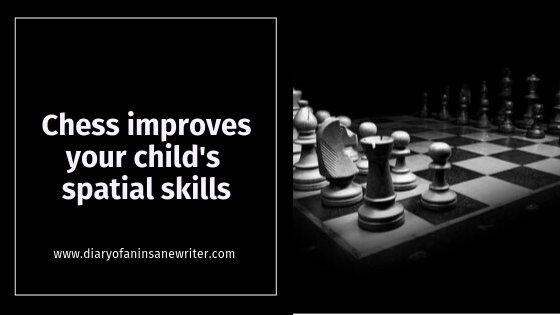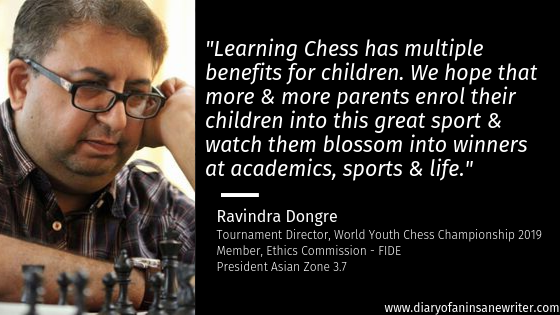Did you know that chess originated in India? Well, it did! The earliest precursor of modern chess is a game called chaturanga, which flourished in India by the 6th century. Unfortunately, Chess hasn’t gained the popularity & momentum it deserves.
Recently, DiaryOfAnInsaneWriter learned that the World Youth Chess Championship 2019 is being hosted in India for the very first time! Over 65 Chess Playing nations and 700+ kids under the age of 18 will be battling for 6 championship crowns.
During an exclusive interview with Dr Parinay Fuke, President of All India Marathi Chess Association a lot of useful insights about chess were revealed. As a mother of two growing kids, I was naturally curious and wanted to know more about the sport.

Parents often question:
Why should children learn chess?
What are the benefits of learning chess for children?
What does chess teach a child?
What is a good age to learn chess?
To seek answers to parents’ questions, DiaryOfAnInsaneWriter met up with Ravindra Dongre, Tournament Director, World Youth Chess Championship 2019.
Mr. Dongre is the first Indian to be elected to the Ethics Commission of the World Chess Federation (FIDE). At present, he is also the President of Asian Zone 3.7. Though he has a successful family business, those in the chess community view him as an individual who has dedicated his entire life to Chess.
Mr. Dongre helped us with outlining 9 benefits of making your child learn to play chess:
Chess helps increase focus & concentration
Parents today often wonder that the children of this generation are always on the phone and their screen time too much and their attention span is a bare minimum. Chess is a sport that requires complete attention and this increases focus and concentration.

Chess makes kids assertive by teaching them to win & lose with equal grace
Chess is a mind-game and the one with stronger mental strength tends to win. Losing doesn’t mean that you are low on mental strength, it only allows you to accept your thought process at that moment which made you choose a wrong move. Chess teaches you to accept defeat and win with grace alike.

Chess-playing makes kids astute planners with prudent foresight
If you fail to plan, you plan to fail. Chess is a sport which requires a lot of planning and strategising. A good player has to plan so many moves ahead and has to think through what moves the opponent can make. This surely aids children to hone their thinking skills so that they can become better planners of life.

Chess raises your child’s Intelligence Quotient (IQ)
IQ is an outcome of brain exercise. Chess as a sport always ensures that the brain as a muscle is flexed continuously. It inculcates a habit of thinking and makes your brain sharper.

Chess increases children’s problem-solving skills
There are more moves in chess than there are atoms in the universe. Yes, chess teaches you strategy and also allows you to think ahead and think fast. Solving problems too requires a lot of fast thinking and to think ahead to anticipate arising problems. If one is a chess player, chances are that he/she will be a great problem solver.

Chess improves your child’s spatial skills?
Engineers, Architects and other special career require spatial skills. It is a skill, which require you to imagine and visualise objects which are not there in front of you and you are still able to see them clearly. A chess player does this all the time and is very good at spatial skills.

Chess improves the memory of your child
A chess player has to remember not only his/her moves, but also what the opponent has played or what all can he play in response to your moves. Only a child with a good memory can store and remember so many moves which are dynamic in nature.

Chess exercises both sides of the brain & thus aids your child’s whole brain development
Spatial skills require right-brain thinking and logical thinking requires left-brain thinking. Chess allows a child you use both sides of the brain and thus enhances the holistic development of the child.

Chess increases your child’s Creativity Quotient
Right brain fosters creativity and the more one uses it, the more creative one becomes. As chess uses both sides of the brain, the child’s creativity quotient improves considerably.

If you have any questions regarding Chess or Chess coaching, do write them in the comment section below. We will surely get them answered by Mr. Dongre.
In case you want to know more about the World Youth Chess Championship, please check out their online presence: Website | Twitter | Instagram | Facebook | YouTube.
Penned by:
Mayura Amarkant
I am taking my blog to the next level through #MyFriendAlexa.




I find learning to play chess alongside my children to be much more meaningful because offers quality time and experiences that we will remember for a lifetime. If you’re sold on learning to play chess with your little ones, you not necesary need to get your family a chess set. You can use whatever your imagination will tell you :). And if you are wondering where and how your child can start, there is a book written by Maksim Aksanov – net-bossorg/chess-puzzles-for-kids-by-maksim-aksanov. It is best to teach kids some strategy tips and how to have a proper look on a chessboard. Also, when your child will eventualy get bored, you will find there nice colorbook 🙂 Also there are a family board games, based on chess, like Storytime Chess and Family Fun Chess.
LikeLiked by 2 people
We found, at school, the kids who played chess did better in reading and mathematics.
LikeLike
Chess is a serious challenge. In college, and sometimes after, I played and sometimes competed. I think my highest level was 1,600, but normally 1,400 or so. Some players can “see” the board. One friend checks quadrants, checking each part as he plays. Others study openings and maneuvers, including past players. I sometimes practice situations, from a book, which is an education all in itself. Some players just can see many moves ahead. One move, or one wrong move, against a really good player, ends it. As I see it, just have fun. Just playing opens understanding.
LikeLiked by 2 people
i am trying to learn chess. lets hope i will aquire these skills soon.
LikeLiked by 1 person
Agreed!
LikeLiked by 1 person
Mayura, I always like the depth of research done in your posts. Even I feel Chess has many aspects to it.
LikeLiked by 2 people
I have no idea about the history of this game so I didn’t know that chess was originated in India. And yes, it is very important for every kid to learn it.
LikeLiked by 2 people
We love playing chess and it’s something that brings us all together.
LikeLiked by 2 people
My father had taught us to play chess and now I see my niece also interested in playing chess. It helped us in learning how to plan carefully.
LikeLiked by 2 people
My husband once upon a time was the State Level Champion in Chess. But due to the lack of family support, he discontinued playing chess for the next level. However, he wants our kids to play. In fact, I believe it is a great game for mind power and concentration.
Thanks for sharing this post!
#LovelyReads #MyFriendAlexa
LikeLiked by 2 people
I totally agree on your points Mayura. My husband has been playing chess and he always shares these points you have shared with me and has total plans to make our little one learn it when time comes.
LikeLiked by 2 people
Agree with your reasons. Good post.
LikeLiked by 2 people
I love playing chess and am definitely going to encourage my son to play it too once he grows up. #MyFriendAlexa #CloudandSunshineReads
LikeLiked by 2 people
I totally agree with you, I would want my kids to learn chess
LikeLiked by 2 people
Yes, chess really is important for kids, I’m so glad you have brought the spotlight on it! The post explains clearly why kids should learn. In this mobile-video-tv world, we are forgetting to use our brain!
LikeLiked by 2 people
i am so glad that my son loves playing chess and he is now teaching me too
#princyreads
#myfriendalexa
LikeLiked by 2 people
this is really a helpful post for me as a mother sure will make a point that even she learns this game..
LikeLiked by 2 people
Chess is a fun game my hubby and daughter play.I am looking for a good chessteacher.
LikeLiked by 2 people
I always wanted to learn to play chess. I think I should get into it now.😬
LikeLiked by 2 people
One additional positive aspect is learning to think for yourself, which I think is the biggest plus. Reading and math skills, which we saw with a group at school, improved. But in order to advance beyond the highly skilled players, some would play at home, with parents, and one found a book on solving chess problems.
LikeLiked by 3 people
My dad always used to play chess with me …I too feel Chess is really important and the best game for kids to learn various aspects and stay concentrated.
LikeLiked by 2 people